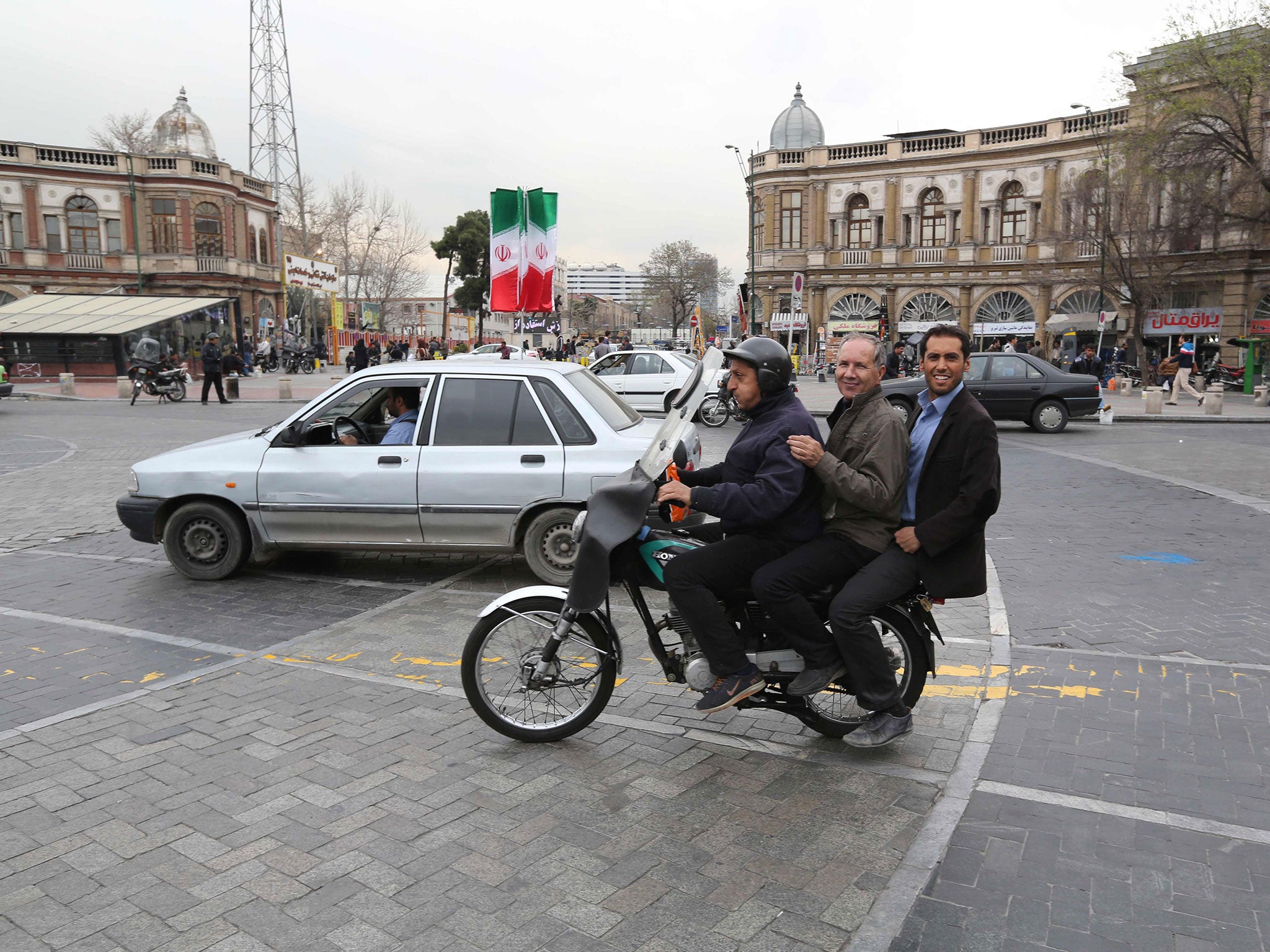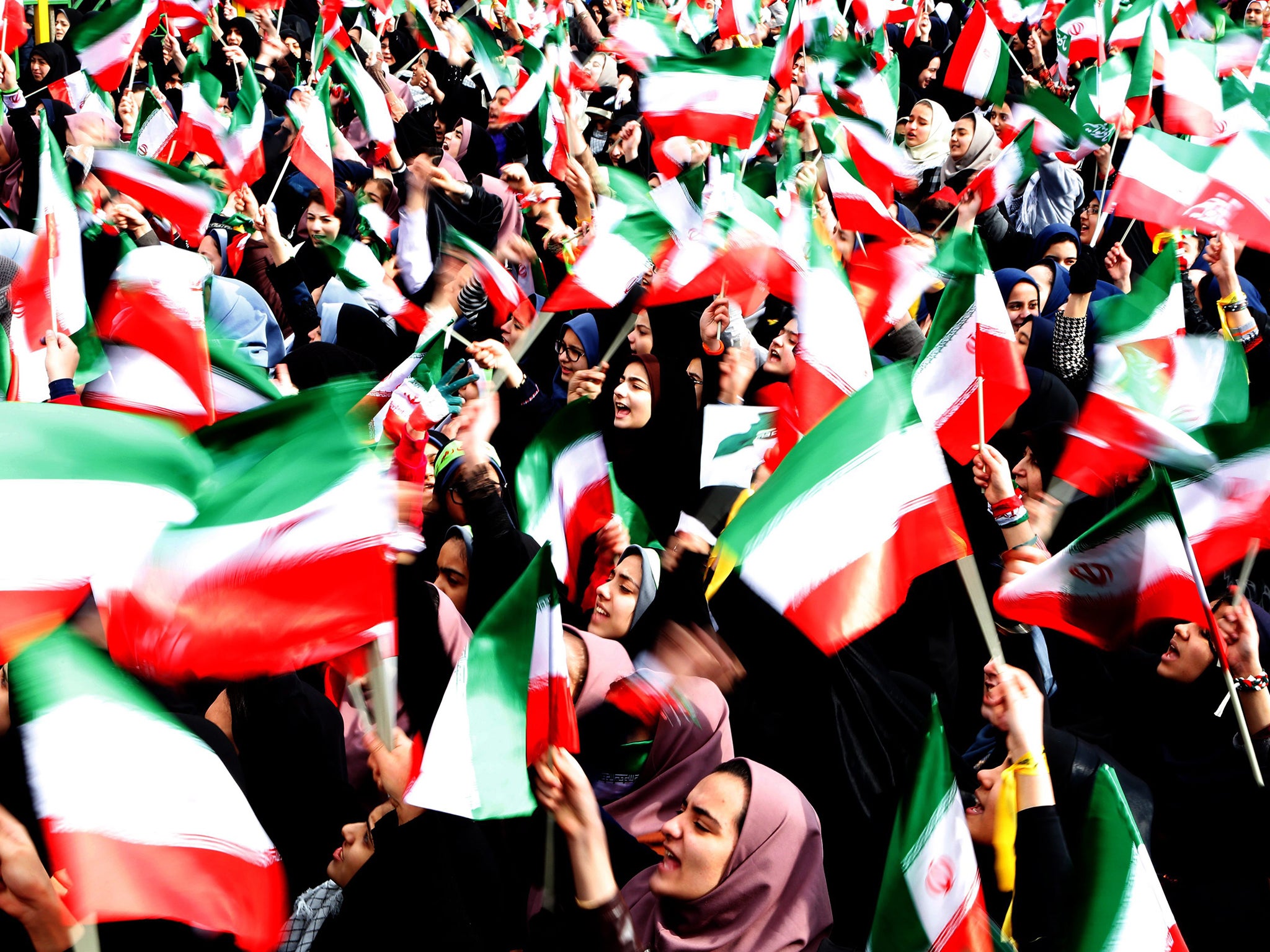Young Iranians are excited about travel, job prospects and domestic reforms - not a fight in Syria
Diplomatic Channels: 60% of Iran's population is aged under 30 - and they don't relish the prospect of being sent in harm’s way in another country

Your support helps us to tell the story
From reproductive rights to climate change to Big Tech, The Independent is on the ground when the story is developing. Whether it's investigating the financials of Elon Musk's pro-Trump PAC or producing our latest documentary, 'The A Word', which shines a light on the American women fighting for reproductive rights, we know how important it is to parse out the facts from the messaging.
At such a critical moment in US history, we need reporters on the ground. Your donation allows us to keep sending journalists to speak to both sides of the story.
The Independent is trusted by Americans across the entire political spectrum. And unlike many other quality news outlets, we choose not to lock Americans out of our reporting and analysis with paywalls. We believe quality journalism should be available to everyone, paid for by those who can afford it.
Your support makes all the difference.Navid and his friends were wondering how much longer Iranian troops will be in Syria. They were worried about the rising deaths and injuries with seemingly no end to the conflict. They heard of a ceasefire, but did not think it will hold.
This was a personal concern for the four students. They would be liable for compulsory national service and they did not relish the prospect of being sent in harm’s way in another country, especially as they were looking forward to a future of reform and prosperity following the triumph of the liberals and their allies in the recent elections.
Standing outside Tehran University, the young men were careful not to blame their government too overtly for getting entangled in the war. It was mainly the fault of the Americans with their muddled policies, they said, and the Saudis and the Turks for creating the jihadists of Isis.
But Navid and young Iranians – 60 per cent of the population is aged under 30 – may avoid facing action in Syria. Greatly strengthened by the mandate from the polls, President Rouhani’s government has quietly made plans to bring as many as 2,500 Revolutionary Guards home from the conflict, leaving around 700 “advisers” behind.
The official position in Iran until recently has been that there were only a small number of “advisers” and “volunteers” in Syria helping Bashar al-Assad’s forces. But there has been a sudden flurry of reports of “martyrs” killed in the conflict, footage of funerals and even a eulogy to a fallen general by the Supreme Leader, Ayatollah Ali Khamenei. The public are being prepared for the news that having made great sacrifices fighting “terrorism” and achieving success, the time has come to bring the men home.
The numbers were being thinned even before the election. John Kerry told the US Congress two weeks ago: “The IRGC (Iranian Revolutionary Guards Corps) has actually pulled its troops back from Syria: their presence is actually reduced in Syria.”
There are a number of reasons behind this. The most urgent task facing the government is the woeful state of the economy. The lifting of international sanctions, which came in the nuclear deal with world powers, presents a huge opportunity to rectify this and there is little appetite for spending this bonus on a costly Syrian deployment.

Iranian officials also hold that Vladimir Putin’s intervention in Syria and subsequent gains by the regime forces has lessened the need for a large-scale military presence. Hamidreza Dehghani, the head of the foreign ministry’s Middle Eastern department wanted to stress that the rebels may still control 60 per cent of the country’s territory, but now only have 40 per cent of the population under their nominal rule, a significant drop in recent months. The rebels are being steadily pushed back, he claimed: “We can’t say [yet] the tide has turned, but it is a more serious fight against terrorism. The Syrian government has used the opportunity well”.
There is the argument that no Iranian government can control the Revolutionary Guards; that the Guards remain intrinsically hostile to the West and Sunni powers, especially Saudi Arabia; and that they want to remain in a state of permanent confrontation with the enemy.
But the recent actions of their hierarchy does not support this narrative. The IRGC backed President Rouhani over the nuclear deal and ensured that 10 US Navy personnel captured in Iranian territorial waters were freed quickly. They have gone along with the Syrian withdrawal and their most powerful figure, Major General Qassem Suleimani, made a point of endorsing the parliamentary speaker, Ali Larijani, a friend of reform, in the elections.
Missile tests this week, accompanied by bellicose statements by IRGC commanders, could be viewed as aggressively challenging the West and flouting of the nuclear deal. Washington has said it is still verifying whether the tests are in breach of the agreement – with US Vice-President Joe Biden saying his country “will act” if they were. The UN has confirmed that the tests did not breach a resolution passed last summer. The launches were more likely intended to reassure the country’s hardliners who are smarting from their election defeat.
Similarly, Tehran is keen to reassure its allies in Syria that a contingent would be kept behind there to help state forces. But just what kind of Syrian state would be left at the end to help?
The prospect of the country splitting into Alawite and Sunni enclaves would not necessarily harm Iran’s interest as long as it retained access to the Lebanon and its Hezbollah allies.
A Sunni statelet dominated by the Muslim Brotherhood (influential among the Syrian opposition) need not be a big problem for Iran either. Tehran strongly supported Mohamed Morsi’s government in Egypt and condemned its overthrow.
There would also, of course, be the added satisfaction in such a scenario of knowing that the Brotherhood is anathema to the Saudis, their bitter regional rivals.
The recent decision by the Saudis to punish Lebanon over the presence of Hezbollah in the country by slashing billions of dollars in aid and banning Saudi tourists from going to the country is regarded as an unexpected gift in Tehran. Iran will take advantage, striving to fill the vacuum and spread influence.
One of the great benefits of liberalisation and Iran opening up internationally, Navid and his friends wistfully stated, would be the opportunity to see the world. Lebanon, starved of Saudi tourist money, could well be grateful hosts in the future for these young travellers.
Join our commenting forum
Join thought-provoking conversations, follow other Independent readers and see their replies
Comments